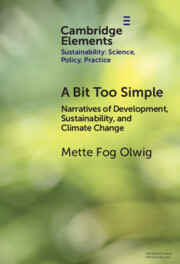Refine search
Actions for selected content:
1 results

A Bit Too Simple
- Narratives of Development, Sustainability and Climate Change
-
- Published online:
- 30 September 2025
- Print publication:
- 30 October 2025
-
- Element
-
- You have access
- Open access
- HTML
- Export citation
